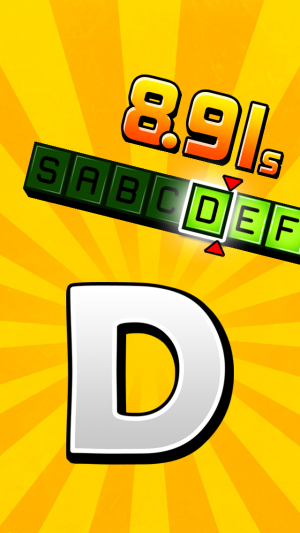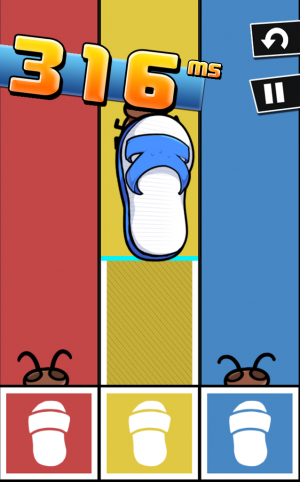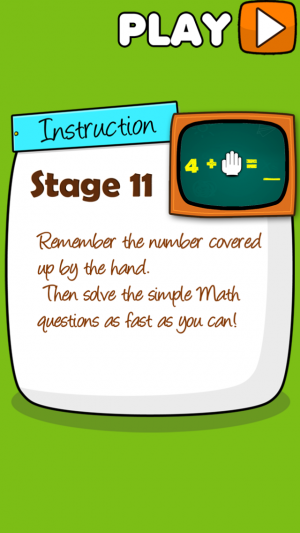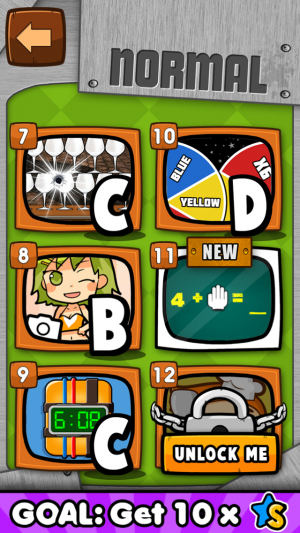 To call The Hardest Game Ever 2 (HGE2) the “hardest game ever” is a bit deceptive. Rather, the game hinges on a series of simplistic challenges that range from mindlessly easy to frustratingly difficult. New stages unlock as existing stages are passed with varying degrees of success, which is rated according to a letter-grade system. Getting a higher score will earn you a “S” (for “Star”) and a certain amount of stars are required for unlocking further levels. The difficulty of the game comes from needing to acquire so many S-level rankings, rather than just passing the minigames themselves.
To call The Hardest Game Ever 2 (HGE2) the “hardest game ever” is a bit deceptive. Rather, the game hinges on a series of simplistic challenges that range from mindlessly easy to frustratingly difficult. New stages unlock as existing stages are passed with varying degrees of success, which is rated according to a letter-grade system. Getting a higher score will earn you a “S” (for “Star”) and a certain amount of stars are required for unlocking further levels. The difficulty of the game comes from needing to acquire so many S-level rankings, rather than just passing the minigames themselves.
Challenges center around the timed tapping of various on-screen buttons that change depending on the task at hand in each of the 24 main levels. The player might drum two fingers on the screen to control an animated character running up the stairs or to balance the tipping head of a drowsy child, solve quick observational games by tapping the right answer to a relatively easy question (determining which hand wins a rock-paper-scissors match, for example), or must keep track of the number of finger-taps necessary to complete a task without going over and therefore losing the round. These games are based around everything from tickling a foot with a feather, stacking colorful ice cream cone scoops, solving basic math equations, stopping a bomb countdown, squashing cockroaches, and catching falling eggs.


If a challenge proves to be too difficult the game allows you to buy “Cheats,” which will let you advance automatically. The game also allows a finite number of “Instant Retries,” which allows the player to replay any level with a quick tap of a button rather than going back through the menu. Instant retries, of course, can also be purchased or the player can opt to purchase “Arcade Mode,” which offers unlimited retries and an ad-free game. Failing a challenge and having to navigate the main menu shouldn’t have been too-punishing of a task; however, the game will sometimes glitch and shutdown after the “Failure" screen, which is annoying and will hopefully be fixed in a later update. The menu screen is, for the most part, easy to get through but for some reason once you select a game and are brought to an explanation of the gameplay mechanics, you can’t get back to the main menu without allowing the game to start and then pausing and exiting. This seems like a strange oversight.
The range of available games means that it is hard to find a blanket statement with which to rate the gameplay. The visual-queue and timing-based games were more enjoyable to me than the math-related games, but this is subjective and will depend on the player’s preferences. Overall, the games have a tendency to be mindlessly entertaining but quickly become repetitive. There is no incentive to pay for any in-game content or to keep playing if you get stuck because there are only 24 stages to acquire in total and nothing to do but replay them all when they are all unlocked. Due to the simplicity of each game, the replay value is minimal. The player doesn’t earn any sort of achievements or content outside of new stages. I’m thinking of similar games like Dumb Ways to Die, where victories unlocked more of the characters on the opening screen. There is no actual value to this but it is satisfying to reach a certain number of points and have it commemorated in some small way.


Personally, I found that once I had tried a handful of the games in HGE2, I could put it aside and not be bothered to pick it back up again. I enjoyed the time that I had with the game and the first 12 stages were easily unlocked so the initial play-through was encouraged by constant forward momentum. The games are simple yet satisfying, the music and animation is quirky and fast-paced. The different visuals and concepts for each mini game are playful and often humorous. However, once I reached a point where I would have to replay previously passed levels to earn a certain number of “Stars," I lost interest. If you like brain teasers, you will probably enjoy what this game has to offer. The repetitiveness and lack of content is a downfall that doesn’t mean that you shouldn’t give the game a try, only that you shouldn’t expect for it to extend beyond one bored train ride to work or a single rainy afternoon indoors.